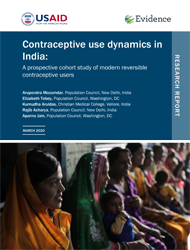 This report highlights the contraceptive use dynamics among 2,699 married women in India who began using one of four reversible contraceptive methods over one year. Women aged 15-49 were enrolled into the study from Odisha and Haryana states within one month of starting their reversible method—interval intrauterine device (IUD), postpartum IUD (PPIUD), injectable contraceptive, or oral contraceptive pill (OCP)—and were interviewed at four time points: at enrollment into the study, and three, six, and 12 months after enrollment. Study findings include the quality of care received at the time of method adoption, experience and management of side effects, reasons for discontinuation of the enrollment method, dynamics of contraceptive use after one year, changes in fertility preferences, and the method-specific experiences related to contraceptive use and pregnancy over the course of the study.
This report highlights the contraceptive use dynamics among 2,699 married women in India who began using one of four reversible contraceptive methods over one year. Women aged 15-49 were enrolled into the study from Odisha and Haryana states within one month of starting their reversible method—interval intrauterine device (IUD), postpartum IUD (PPIUD), injectable contraceptive, or oral contraceptive pill (OCP)—and were interviewed at four time points: at enrollment into the study, and three, six, and 12 months after enrollment. Study findings include the quality of care received at the time of method adoption, experience and management of side effects, reasons for discontinuation of the enrollment method, dynamics of contraceptive use after one year, changes in fertility preferences, and the method-specific experiences related to contraceptive use and pregnancy over the course of the study.
The findings from this study will be useful to program designers, policymakers, and health care professionals in delivering voluntary family planning services in India.